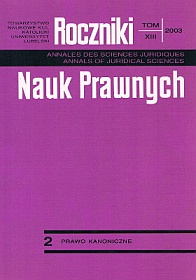Elementy kanonicznego procesu karno-administracyjnego
Abstrakt
The Code of Canon Law of 1983 sanctions the principle which is commonly known in the law and canon law that says nulla poena sine processu. According to this principle, no canonical punishment can be meted out or declared with a legal penal or administrative trial (cf. Can. 1341). It is necessary to go through the evidence before the punishment can be administered or declared, and this necessity is sanctioned by the legislator in the following canons: 1342 par. 2 and 1718 par. 1, f. 3. Inasmuch as there are justified reasons that interfere with the trial, the punishment may be meted out or declared by a non-legal decree. The penal means and penance may in each case be imposed by way of a decree (Can. 1342 par. 1). In reference to right reasons to leave the legal procedure and use the non-legal one, one should mention that they are to be understood as obstinate (obstent) to the application of the legal trial, and not like those which only suggest that the administrative procedure is to be chosen.
It is one's own ordinary bishop or the bishop of the place where crime was committed that are competent to issue a decree that metes out or declares punishment. Now meting out punishment with the use of the administrative procedures does not allow for arbitrary conduct on the part of the ordinary bishop, even thought this question is decided in the form of a particular administrative decree (cf. Can. 48). He must adjust himself to all norms which regulate particular administravit acts, especially decrees. The decree by means of which punishment is meted out or declared is a complete decree. It presumes a legal procedure that has many stages. Therefore we are dealing here with a process, ie a series actions and necessary prior actions before the final, decisive decree is issued.
Canon 1720 establishes the stages of such a procedure. The appropriate ordinary bishop has therefore a duty to notify the accused the act of accusation and point to respective evidence. Thereby he gives him a chance to find counter-arguments and evidence for his defence, if he does not fail to appear in person when appropriately summoned by his ordinary. If he does come, the ordinary may begin the penal administrative trial against the absent. In the penal administrative trial the accused may be interrogated and he has a right to defence. In order to mete out punishments called censors, the ordinary must first administer a canonical rebuke designed to bring about improvement in the culprit.
After the instruction of the case has ended, the ordinary - taking into account all evidence and arguments - should consider them together with two assessors. A thorough assessment of the evidence should help the ordinary accomplish moral certitude as to how decided in the case. The penal administrative trial calls for the same measure of moral certitude as the legal penal trial. The decree administering punishment should be given in writing with, at least, a brief motivation. If the executive part is missing, the administered or declared punishment may not be imposed and after some time (determined in Can. 1362) the complaint against the execution of the punishment is due to prescription. The accused has a right to appeal against the decision of the ordinary. This recourse always effects a suspense. The person who appeals against the verdict of guilty has always a right for a defender or proxy, without provoking an unduly delay. What is more, the defender can be a court-appointed lawyer if the appellant has not done it before and his superior deems it necessary for such a defender. The branches of the Civil Service of the Roman Curia are the only appropriate organs to receive a hierarchic discourse against the penal decrees issued by an ordinary. One may lodge a litigation-administrative recourse from the decision of the Congregation of the Roman Curia to the Sectio Altera of the High Tribunal of the Apostolic Signature iter the procedural appeal against the decision that metes out punishment in the non-legal trial should be considered closed.
Copyright (c) 2003 Roczniki Nauk Prawnych

Utwór dostępny jest na licencji Creative Commons Uznanie autorstwa – Użycie niekomercyjne – Bez utworów zależnych 4.0 Międzynarodowe.


